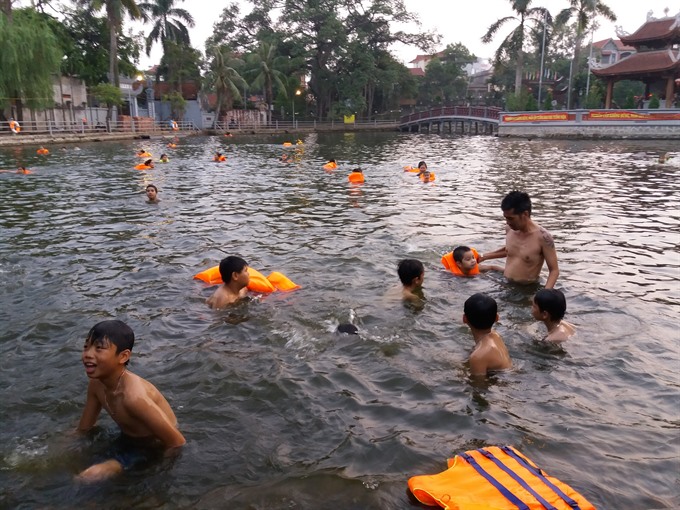 Society
Society

With drowning still a major problem in Việt Nam, Nguyễn Phi Hậu turned his village's pond into a "pool" to teach local residents to swim.
 |
| The 5000-metre pond in Thiên village has become a favourite place for many villagers, especially children. VNS Photos Thu Hà |
by Thu Hà
For Phùng Thị Hồng, a 56-year-old resident of Dương Liễu Commune, Hoài Đức District, in the suburbs of Hà Nội, it is hard to finish a day without going swimming in her village’s pond.
She swims almost every day, wearing a life jacket, when the weather is not cold.
“It makes me feel healthy and relaxed,” Hồng says. She often comes here with her 11-year-old grandson who could not make it today because he is busy at school.
“He enjoys swimming very much,” she says
Hồng and her grandson are among many villagers here who have found swimming a new leisure activity.
On a hot summer day, hundreds of villagers come here to swim, says Phi Thị Loan, who brings her 4-year-old son with her.
“It is a little bit cool now so it is less crowded. But if you come here in July and August, I am sure you will hardly find a spare space. Many people come from neighbouring communes as well,” she says.
While many ponds in villages across Việt
The idea came from Nguyễn Phi Hậu, a 63-year-old businessman in the commune, who also headed the group of people carrying out the work. His inspiration grew from his wish that more people knew how to swim to prevent drowning – one of the leading causes of death for Vietnamese children.
According to the Ministry of Labour, War Invalids and Social Affairs, up to 6400 people across the country die every year of drowning. About 50 per cent of those who drown are children. Roughly nine children drown every day.
“I wanted to do something to change the situation so we would not have to hear such heartbreaking news happening to our community,” Hậu says.
“The nearest swimming pool is in the centre of the district, about 4 kilometres away from here. Not many people want to go that far, just for swimming.”
As a person who enjoys high prestige in the community, Hậu was successful in calling on local residents to donate money and asking them to join him in his efforts to realise the plan.
His group collected nearly VNĐ100 million (US$ 4,500) for the job.
A lot of work was done. Piles of sandbags were laid on the bottom of the pond, near the edge, to reduce water depth. Banisters were erected around the pond to prevent people from falling down. A sewerage system was installed to prevent wastewater from local households from flowing into the pond, and water-fern was grown to help purify the water.
This July, Hậu and his group officially established the commune’s first-ever swimming club, attracting nearly 150 members, many of whom are old people and children. The commune’s authority has given them a small room just a few metres away from the pond for the club office.
“Here is the loudspeaker and the club’s notice board,” says Hậu, who is also the club chairman. “We use them to remind swimmers of the ‘dos and don’ts’ to ensure safety and preserve the scenery”.
Every day, a member of the club is tasked with picking up garbage and scum floating on the pond surface. Other members who have free time join in teaching people to swim.
“Our members also volunteer to be rescue workers. There is always a group of people present here to keep watch over swimmers,” Hậu says, pointing to a group of people swimming in the middle of the pond.
Phùng Duy Tuyến, a member of the swimming club, says he joined Hậu’s group in the beginning because he found Hậu’s plan very meaningful.
“Hậu is a busy businessman but still thinks about community benefits. That’s why I decided to join hands with him,” he says.
Tuyến, who works at the management board of the local market, also comes to the pond every afternoon when he is not busy. He is happy that, thanks to their activities, many villagers have learnt how to swim.
“At first, some older people were reluctant to come, but when they saw younger people enjoying the activity, they have joined very actively,” he says.
31225331PM.jpg) |
| Nguyễn Phi Hậu (first from right) teaches a child to swim |
Nguyễn Duy Hoàng, a fifth grader of
“Some of my friends used to be afraid of water, but now they all can swim. My friends from Đắc Sở Commune also come here to learn how to swim,” he says.
In August, the club organised a series of events at the pond, including a big art performance, a swimming contest, and a duck-catching contest. The VNĐ80 million budget for these events also came from public donations and from Hậu, who contributed half of the money himself.
The day-long series of events, said to be the first of its kind in the region, drew hundreds of attendees and thousands of spectators.
“It was a big success. More than 300 people performed on the stage. We gave 28 awards for swimming contestants in eight age categories,” Hậu says.
“The commune was overcrowded with thousands of visitors from everywhere.”
Hậu says it is hard to organise such a series of events annually. But his club will try to maintain at least the swimming contest every year.
“It will encourage people to learn how to swim and to swim well. My wish is that everyone will swim well enough to be able to rescue others,” he says. — VNS




